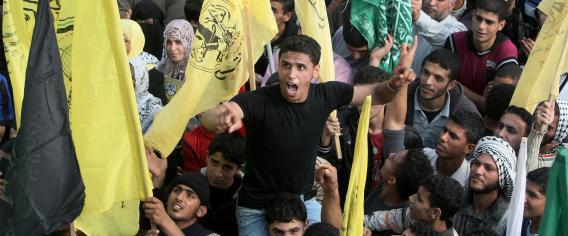After eight days of a bloody conflict, quiet returned to Gaza Thursday as a cease-fire brokered by Egypt, along with the United States, appeared to be holding. Gazans took to the streets to celebrate the end of the worst cross-border fighting in four years as Hamas leaders said that Israel’s decision not to send in ground troops was a sign of new Hamas power, reports the Associated Press. Israel also tried to claim victory, saying it had killed several senior leaders and weakened Hamas’ military capabilities, but the mood of its citizens was decidedly mixed. Although some were clearly grateful for the peace and quiet, there was also much frustration, particularly in southern Israel, amid claims that the operation was abandoned too quickly.
Without a doubt, the key part of the deal is that it has so far managed to avoid a ground war that Israel had threatened could take place. But “it leaves the crux of the conflict unresolved, with neither side winning major concessions” and both Israel and Hamas warning they’re ready to take up arms again if the deal collapses, notes the Washington Post. Despite the widespread skepticism, there is also some (very premature) optimism that the cease-fire could launch a new era of relations between Hamas and Israel that might just bring an end to rocket fire from Gaza and perhaps even open the borders of the Palestinian territory.
Schools remained closed in southern Israel Saturday as what appeared to be a false alarm in the morning sent people rushing to shelters. A total of 162 Palestinians, more than half of them civilians, including 37 children, were killed during the conflict, Reuters reports. The nearly 1,400 rockets that were fired into Israel killed four civilians and two soldiers. Although Israel said several rockets were fired from Gaza shortly after the cease-fire came into force late Wednesday, there were no injuries and Israel didn’t respond, reports the Guardian.
The New York Times highlights that both sides emphasized they only agreed to the cease-fire due to international pressure. The next few days should give a clearer indication of what kind of role Egypt’s new Islamist government will play in the region’s most enduring conflict. So far though, notes the Times, Egypt’s President Mohamed Morsi has demonstrated a willingness to balance his public support for Hamas with the need to maintain peace with Israel.
In a separate piece, the Times points out that the conflict may very well mark the beginning of what could be a key partnership between President Obama and Morsi. The White House appears to be using the pages of the Times to send a message to Cairo: Obama has a high opinion of Morsi. “The thing that appealed to the president was how practical the conversations were — here’s the state of play, here are the issues we’re concerned about,” a senior administration official said.
